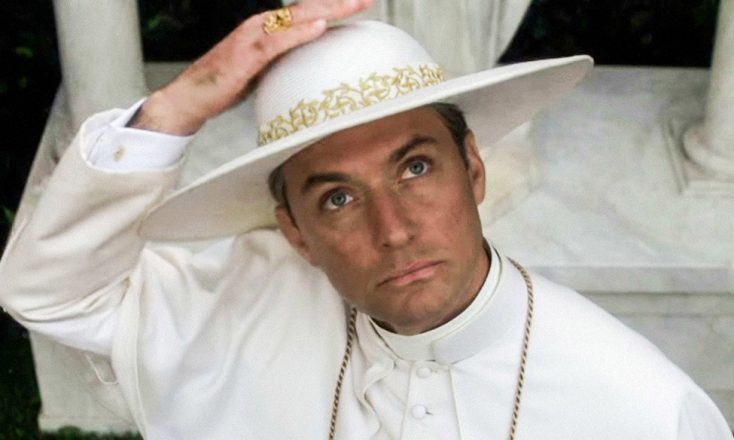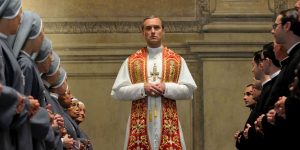By JUDY SLOANE and ANGELA DAWSON
HOLLYWOOD—In his two decades as an actor, Jude Law has played his share of heroes and villains. Now he rises to the level of the Holy See in the HBO miniseries “The Young Pope.” Not only is Law’s Pope Pius XIII young (by pope standards) but he also plays the character as an American, the first one ever elected by the College of Cardinals in this fictional drama.
Born Lenny Belardo (Law), this New York-born priest rises to the highest rank of the Roman Catholic Church in this engrossing miniseries directed by Paolo Sorrentino (“Youth,” “The Great Beauty”).
The 10-episode series, which already has aired in Europe, delves into the private and public persona of the newly elected pope, whose primary vice appears to be that he’s a smoker. It premieres on HBO Sunday, Jan. 15 at 9 p.m., and will air on Sundays in the same time slot during the next 10 weeks. (A second season is reportedly in development.)
The 44-year-old British actor spoke at the Television Critics Association press tour just before the series made its U.S. premiere. He discussed what attracted him to the pontiff role.
Q: Was playing the Pope transformative for you in any way? What did you take away from this project personally or professionally?
Law: Transformative? Yes, I think it was. But I also think the thing I took away that really stands out was the experience of working with Paolo. It was really eye opening to work with someone who had such clarity of vision and contributed such an extraordinary signature and heightened, just every day, in every way, what we were all doing as a cast and as a team. I wasn’t brought up in a particularly religious household, but I’ve always been curious about faith and one’s personal relationship with faith. And I suppose it encouraged me to question and look at that a little more.
Q: The idea of the Pope smoking—did that come from you? Is it supposed to symbolize something?
Law: It was scripted, and I believe it was inspired by (Pope) Benedict XVI, who apparently liked a cigarette after Mass. I thought it was a wonderful kind of detail of character that Paolo included. His scripts are rich with detail of both musical reference and character reference. For an actor, that’s joyful. You sink your teeth into those.
Q: Did you ever think you’d play the pope?
Law: Absolutely not. If you’d asked me two years ago, I would have laughed at the idea. But I was just very keen to work with Paolo, and I would have jumped at any opportunity. It just so happened that he was also coming with this extraordinary part and imaginative world.
Q: How aware are you of the various “Young Pope” memes on Twitter that have been floating around social media?
Law: Having spent the last week both in New York and here doing lots of press, I’ve become very aware. At the beginning of the week, I was completely unaware of what a meme was. So having been educated and now shown them, I’ve become very aware. And I love them. They’re very funny, very imaginative.
Q: Is there any concern that the enthusiasm for the memes could overwhelm what the actual show is?
Law: I hope not. By all accounts, it will—I hope—just provoke and prompt interest and intrigue. Something Paolo told me just this week, one of the most exciting facts of the screenings in Europe was the high level of young people that got involved. I don’t know that meme trends are reflective of young people’s interest, but if it is, then I’m very excited that they may also become our audience.
Q: Could you extrapolate the concept of “the will of the man” becoming “the will of the people?”
Law: I wish I had an answer. I always go back to Paolo’s talent as a writer. Great writers and great creative minds have a natural antenna that reads what is in the ether. I’m safe to say that perhaps some of this came from the religious terrain of the past. It also came from the Italian political terrain of the past. Clearly, there was a certain amount of preemptive registering of what was going on internationally. I wouldn’t say that we are necessarily a direct kind of comment on what’s happening, but what’s been extraordinary is it just highlights how relevant sometimes this sort of reactionary voting, or the idea of voting in the unknown, can lead you. My answer really lies in the work that we’ve done in “The Young Pope” rather than what I can possibly comment on from myself.
Q: Can you talk more about Lenny’s vulnerabilities and more human side, assuming there is one?
Law: Sure. And there is. One of the reasons I love Paolo’s work is that he can take epic themes and operatic scale and make it very human. When I was preparing for this part, I initially started thinking, “Gosh, I need to educate myself on papal history, on Catholic history, on life in the Vatican.” But I didn’t really find any answers as to who this character was. Paolo kept reminding me that really I had to concentrate on who Lenny Belardo was, Lenny the man. Lenny is an orphan, and really, at his heart, he is trying to understand this lack of love. As Pope Pius, he is trying to understand that and understand his sense of solitude through his power. The vulnerabilities are there and, I hope, slowly unpeeled if you stick with the 10 hours.
Q: A big part of the Church has always been the visuals and the spectacle. It’s also a big part of filmmaking. Were there moments while you were making this where you were just in so much visual spectacle around you. What did you feel like when you were in the costumes and filming those elaborate ceremonies?
Law: Sure. Twenty or so years ago, when I was starting out, I underestimated the power of costume as an actor. And in this role, unlike almost any other, the potency, every day, whether it was putting on his daily white robes or whether it was the more formal robes of ritual, it had a great impact and was incredibly helpful, although, at times, very uncomfortable. I’m glad I played it in my 40s and not in my 70s because I don’t know how those guys carry that stuff when they’re that old. A huge amount of reveling and feeling the sort of status of someone in that position is helped by the reaction of others. When you’re being carried in by 12 men on a golden throne with bejeweled robes, it helps a lot.
Q: What kind of questions did you have for Paolo? How much had you seen before you signed on?
Law: Well, I signed on pretty quickly. There was a sort of three-page premise of where and what the story was going to be. And then Paolo started writing, and I read the first two (pages), but I was already pretty involved and committed.
Q: What is this character not to you?
Law: He’s not a liar. He’s full of contradictions, which I believe we all are, but he’s particularly contradictory, but he doesn’t lie. He’s a man of conviction from his own standpoint. He’s trying to understand his heart. He’s trying to understand his faith, which you’ll see is ultimately what he’s always been doing, but now the spotlight’s really on him. He imagined getting the top job he would have a direct line to the person who’s guided him and seen him through a lonely existence. That’s God. But the line is busy, and so he has to work out how to answer these questions for himself.
Q: What was it like working with Diane Keaton, who plays sort of a maternal figure to Lenny?
Law: Yeah. She brings a unique sense of humor and mischief and boundless warmth, but she’s fantastically modest too. I remember when she arrived, she was constantly saying, “I don’t know why I’m here. I don’t know what I’m bringing to this. I don’t know what I can do in this role,” because she seemed to be the last person to realize just how loved she is and how her wonderful career kind of is in everyone’s heart. She’s already delivering a huge amount as an actress before she even opens her mouth. I kept calling her my Mama Rose because, as in “Gypsy,” she’s the one always saying, “You’re going to be the pope, Lenny. You’re going to be the pope. You’re a saint, Lenny.” She’s my biggest supporter in the piece. And it was wonderful to work with her.
Q: Early on Lenny says, “I don’t believe in God,” and then he says, “I’m joking.” Did you think he was joking?
Law: No, he’s not joking.
Q: Since this has aired in Europe already, what have your friends, or even your kids, think about you as the pope.
Law: It’s been very warmly received. My sons loved him. My daughter was terrified.
Q: What about your friends? Have you heard anything crazy about them saying you’re the pope now or something?
Law: No, no one’s ribbed me yet.
Q: No one’s calling you Your Holiness?
Law: No, although Diane called me Your Holiness for the entire shoot.
Q: Do you see that character coming back in your career one day eventually?
Law: Yes. We hope so.
Q: Does Paolo have five seasons written?
Law: (laughing) Middle-aged pope.
Q: As you look at the arc of your career, do you view it as kind of a delicious irony that you’re playing somebody wearing the papal garment now, having played the scoundrel Alfie and having played so many rakes in your career?
Law: I haven’t played so many rakes; one or two, more than most. Is there an irony to it? I guess so. I assumed that there was a sort of ironic gag to the casting of me, which is sort of bluffed through the fact that Pius or Lenny turns out to be as conservative as he is. But when I asked Paolo that, it wasn’t because of that at all. So yeah, I guess there’s an ironic smirk to it.






